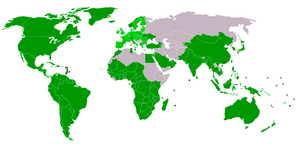International Trade and Australia
Australia is “down under,” making it one of the most remote locations on Earth. A lot of businesses there are involved in import/export. In other words, businesses in Australia have to understand international trade and will likely need financial institutions that understand how to process transactions in foreign countries quickly and efficiently.
Naturally, there are risks with international trade. While the U.S. dollar is the world’s reserve currency, it doesn’t prevent national currencies from fluctuating in value. In fact, an entire market, forex, exists to track these fluctuations. Your payment processor and bank should be able to manage these fluctuations and keep your company profitable.
Reduced Transaction Times
Short transaction times mean that your suppliers are paid on time. Not only does this benefit your suppliers, it keeps them doing business with you. For international transactions, settlement can be expected within a week of the transaction, though this depends on the bank. What’s important is that the process does not require that you purchase specialized in-house software or equipment – both of which could put a drag on processing and transaction times, especially if there is a problem.
Even if your financial institution can’t promise the fastest transaction times, you should look closely at what the organization does guarantee. If one bank cannot guarantee transaction times, but expects a quick turnaround time, you have nothing to tell suppliers. On the other hand, if the transaction time is a bit longer than normal, but the bank guarantees delivery of funds, then this might be worth it.
Efficiency
Efficient transactions matter. Simplicity matters. You want your volume of business to closely match the capabilities of your financial institution. If that’s not possible, then you need to work with a different company. If you require POS terminals, they should be simple to operate and allow you to simplify transactions. Ideally, web-based software would be used since maintenance is handled server-side and you have no equipment to purchase or maintain. With software solutions, your business is also mobile if need be.
An Understanding of Foreign Exchange
While many banks do handle international trade, not all of them do. Your bank needs to be able to hedge risks associated with foreign exchange rates using investments like futures contracts and even call and put options. Specifically, it should be able to deal with transaction risk, translation risk, and exchange risk.
Transaction risk is the gain or loss experienced due to fluctuations in foreign currencies. For example, if your home currency is the U.S. dollar, and you’re doing business in Europe, the euro will fluctuate daily against the dollar. If the euro suddenly weakens against the dollar, this might be good for you since your home currency is worth more. If the euro strengthens, however, you stand to lose money on a business transaction just because of the exchange rate favoring the euro.
Consideration
While doing business in Australia means that you have to accept international trade as the norm, it doesn’t mean it needs to be difficult. The best solutions are often the simplest. Your financial institution should accommodate you, not the other way around.
Dennis Tarver is a business consultant with a penchant for international trade. He enjoys sharing his knowledge on business blogs. For information about foreign currency transfers, visit the link.
.

Category: Business






